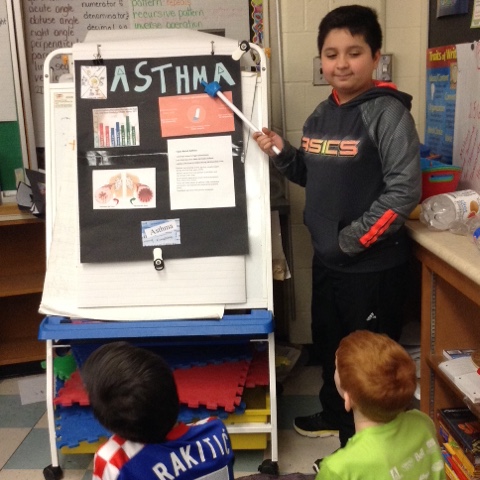Thursday, February 18, 2016
Tuesday, February 16, 2016
Human Organ Systems Study Guide
Human
Organ Systems Study Guide
Know the purpose of each of the
following organs:
- Pancreas
- Liver
- Gall Bladder
- Diaphragm
- White Blood Cells
- Mouth
- Skin
- Trachea aka Windpipe
- Tendons
- Esophagus
- Arteries and veins
- Epidermis, dermis
- Epiglottis
- Alveoli
What is smooth muscle? Name some body
parts made of smooth muscle.
What is your heart rate? What is
considered a normal range for a person's pulse?
What are the functions of the
circulatory system?
What are the functions of the
respiratory system?
Explain the job of White Blood Cells in
keeping us well.
What can we do to stay healthy?
What is the most interesting thing you
have learned in this unit?
For extra review you can also visit my youtube channel to see all the different videos we have watched in our Science-Human Body playlist
Tuesday, February 9, 2016
Volume, Capacity and Mass
This month we have been working on volume, capacity, and mass in Math.
Here are some helpful links to help your child at home.
Volume
http://www.mathworksheets4kids.com/volume.html
http://www.worksheetworks.com/math/geometry/measuring-figures/volume.html
http://www.sheppardsoftware.com/mathgames/geometry/shapeshoot/VolumeShapesShoot.htm
http://www.xpmath.com/forums/arcade.php?do=play&gameid=118 - Minecraft Volume
Capacity
http://www.softschools.com/measurement/games/capacity.jsp
http://mrnussbaum.com/fifth-grade-learning-games/
http://www.softschools.com/measurement/
Mass
http://www.mathworksheets4kids.com/metric.html
http://www.mathworksheets4kids.com/measurement.html
http://www.mathgametime.com/grade/5th-grade
Here are some helpful links to help your child at home.
Volume
http://www.mathworksheets4kids.com/volume.html
http://www.worksheetworks.com/math/geometry/measuring-figures/volume.html
http://www.sheppardsoftware.com/mathgames/geometry/shapeshoot/VolumeShapesShoot.htm
http://www.xpmath.com/forums/arcade.php?do=play&gameid=118 - Minecraft Volume
Capacity
http://www.softschools.com/measurement/games/capacity.jsp
http://mrnussbaum.com/fifth-grade-learning-games/
http://www.softschools.com/measurement/
Mass
http://www.mathworksheets4kids.com/metric.html
http://www.mathworksheets4kids.com/measurement.html
http://www.mathgametime.com/grade/5th-grade
Friday, February 5, 2016
Student Inquiry Science Project
Click this link to access the information sheet, success criteria, final checklist, and rubric for our Science Inquiry Project.
Student Inquiry Project
Please note that in order for an accurate assessment of student work all research and report writing must be completed at school. Students will be given ample opportunities to access technology for this purpose. Materials may be collected from home (books, computer print-outs) and brought to school for the project. Students will be allowed to bring their work home to compile into a final bulletin board.
This is going to be fun!!!
Here are some helpful links
http://www.medikidz.com/gb-en/
http://kidshealth.org/kid/index.jsp?tracking=K_Home
https://www.brainpop.com/health/
http://www.pbs.org/parents/talkingwithkids/health/med_index.html
http://www.cdc.gov/bam/
Student Inquiry Project
Please note that in order for an accurate assessment of student work all research and report writing must be completed at school. Students will be given ample opportunities to access technology for this purpose. Materials may be collected from home (books, computer print-outs) and brought to school for the project. Students will be allowed to bring their work home to compile into a final bulletin board.
This is going to be fun!!!
Here are some helpful links
http://www.medikidz.com/gb-en/
http://kidshealth.org/kid/index.jsp?tracking=K_Home
https://www.brainpop.com/health/
http://www.pbs.org/parents/talkingwithkids/health/med_index.html
http://www.cdc.gov/bam/
Subscribe to:
Posts (Atom)










 Cystic Fibrosis
Cystic Fibrosis



 Allergies
Allergies
 Multiple Sclerosis
Multiple Sclerosis Insomnia
Insomnia Cerebral Palsy
Cerebral Palsy